Issue #16: Wise Child, Juniper, and Colman-The Doran Series
Exploring the subversive, progressive, religious, feminist, and parental guide found in Monica Furlong's Doran Series

Book Review
Wise Child, Juniper, and Colman by Monica Furlong
Relaxing into these YA novels feels comforting, old, strong, and right–like the weights of pottery, stone, or clay tied to the warp threads on an upright loom. Each weight holds bundles of threads taut and true with gravity, creating the structure for the shuttle of time and experience to swish back and forth, changing hues, creating patterns, and weaving the tapestry of a life.
Audio version: Kate reads this article to you!
Book information and ratings:
Title Wise Child (1987) Juniper (1990) Colman (2004) | by Monica Furlong | |
Genre: | Fiction, Fantasy |
|
Subject: | Magic, coming of age | |
Rating: | All time favorites! | |
Read as: | Print copy | |
Readability: | Accessible | |
Subject Weight: | Light | |
How I found these books:
Imagine, for a moment, your witch. Not your earliest witch, necessarily, but the one who first captured your attention. (Chollet ix)
When I read these two sentences in the foreword of Mona Chollet’s book In Defense of Witches, my mind instantly flashed 3 names:
Juniper.
Wise Child.
Euny.
These magical women appeared, revived, in my mind.
Do I still have those paperbacks from my childhood? I wondered…and then a trace of desperation seeped into my chest: I wasn’t sure.
They have always been there, waiting for me, I kept thinking as I searched through all my bookshelves in all the rooms–upstairs, downstairs.
Wise Child and Juniper were definitely missing.
****
My mom ordered Wise Child and later the prequel, Juniper, from a scholastic book order when I was a teen.
They were instant classics for me. These were fiction fantasy stories that made me feel grounded and empowered in my own life, and I reached for them again and again.
I grew to know these characters: graceful, gentle, wise Juniper; petulant, eager, determined Wise Child; hard, knowledgeable, and somewhat scary Euny. They were each distinctly talented, imperfect, and brimming with good intentions, hard work, and a deep seeking to understand each other and to make the world a better place.
****
With my beloved novels lost somewhere between my childhood home and my adult one, I got online to order a used set…and a third name appeared in my search: “Colman, the third in the Doran series,” it said.
What??!
How had I not known about a third book?
And, would it finally finish the story?
About these books:
The magic
This trilogy encompasses the lifestyle and life story of young dorans in training.
The word [doran is] from the Gaelic “dorus,” an entrance or way in (not unlike the English word [door] with the same meaning) signifies “someone who has found a way in to seeing or perceiving.” Learning to perceive the pattern at the heart of being, and to love and protect it, is the way of a doran. (Lory)
This is the best and most palpable type of magic.
****
The stories
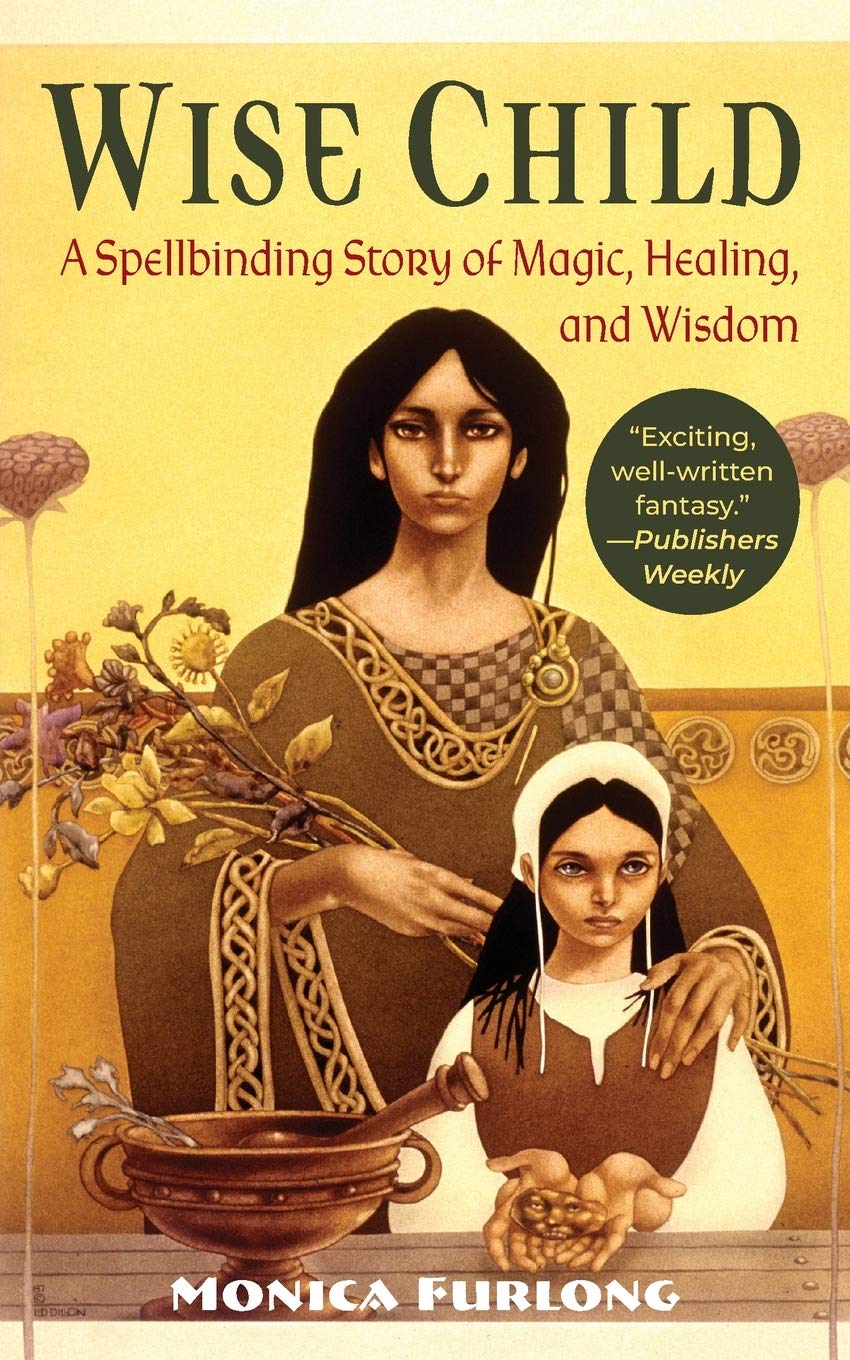
Wise Child
In a place that might be Scotland, at a time that might be the Middle Ages, the homeless Wise Child is sent to live with the local wise woman, Juniper. Wise Child slowly grows in wisdom and self-reliance, learning Latin, mathematics, herbal and healing lore, and a bit about the making of magic. When sickness and hunger stalk the village, the local priest accuses Juniper of being a witch, responsible for the village’s troubles. Juniper, Wise Child, Cormac, and Colman must run, into an unknown future. (Colman Foreword)
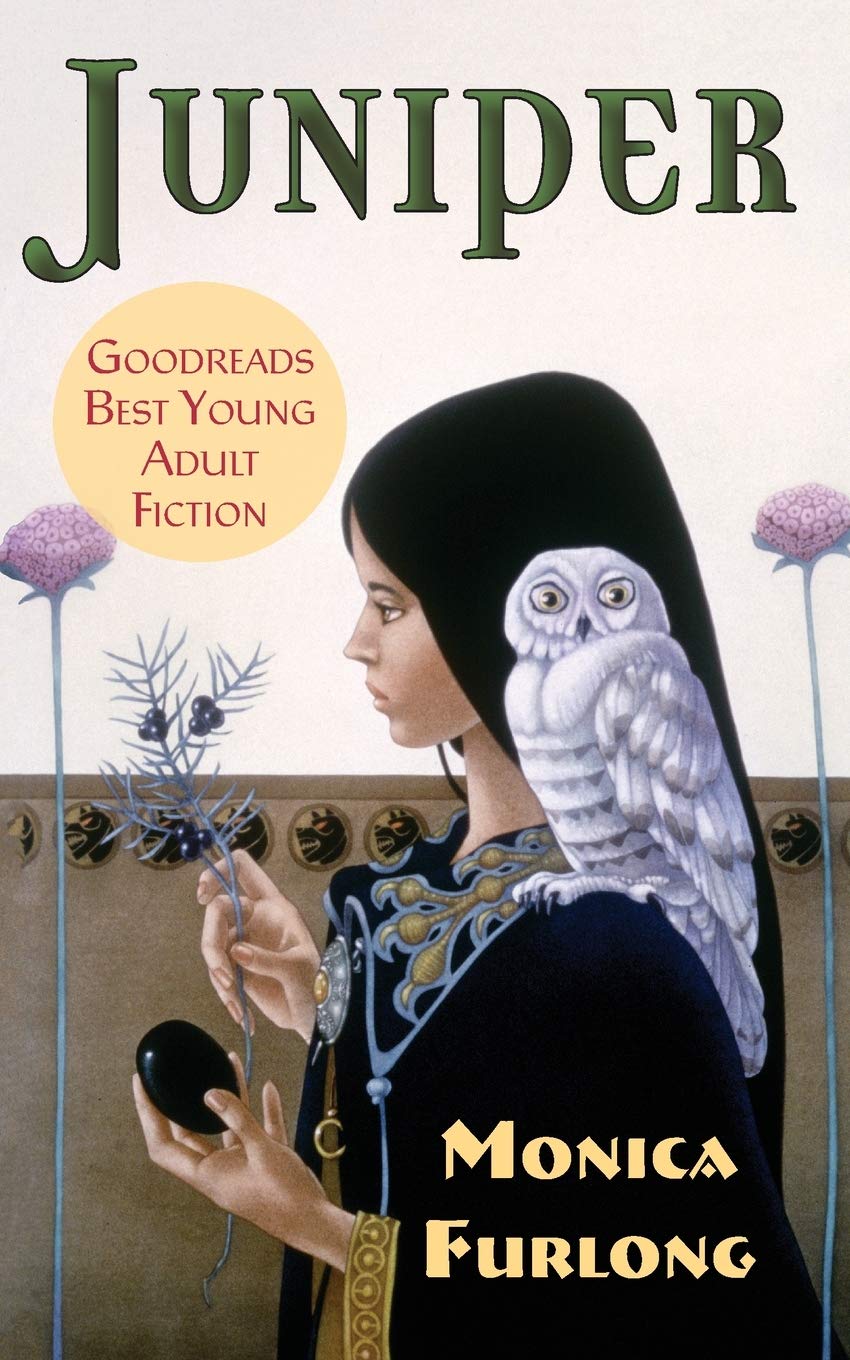
Juniper
[...] Juniper [does] not continue the story of Juniper and Wise Child’s escape. Instead, it began the story of Juniper from her early life as a princess of Cornwall, long before the events of Wise Child. The young Juniper–cranky, stubborn, and pampered–protests when she is sent to learn from Euny, an impoverished wise woman. From Euny, Juniper learns of herbs and magic, love and friendship, and her own growing “powers of the mending sort, the healing sort.” When the sorceress Meroot and her husband, the Gray Knight, threaten Cornwall, only Juniper and Euny can save it. (Colman Foreword)

Colman
This last book of the trilogy is a tale of sea voyages, devastation, courage and fear, and the importance of love and loyalty. Once again, Juniper, Wise Child, Cormac, and Colman struggle to save their land from a powerful evil. (Colman Foreword)
****
Rereading these books as an adult was massively satisfying; I was enthralled all over again! My young reading pallet had been directly on-point: these books still held everything I remembered…and had had more of an impact on me than I realized.
****
The personal impact
“You’re not like most grownups, are you?”
“Not much!” said Juniper, cheerfully. (Wise Child 113)
****
I have long considered myself a gentle parent. For better AND for worse, that’s the way I need to raise my children. (And, believe me, I am well aware of the drawbacks of my approach!) I have a hard time adhering to strict schedules, yelling a lot, or dolling out punishments. I am uncomfortable with anything that “forces” my children to do things against their will (even sending them down the slide alone for the first time!). This results in a LOT of discussions and bids for cooperation on my part.
I’m a big proponent of:
Children are people, too.
And
Moms (and dads) are people, too.
And, I say it a lot.
****
These are boundary-making statements.
These are statements that honor personhood.
These are statements that require respect, compassion, and insight.
This means that in our family, it’s ok to have a bad day, to feel your feelings, to not be on “perfect” or expected behavior. HOWEVER, this is not an excuse for rude or abusive behavior (sustained yelling, screaming, name calling, any kind of hitting, etc.) on anyone’s part. I draw a hard line there/that shit gets shut down fast!
So, sure, my kid can sulk at the dinner table because their friend had to go home, and family dinner time is stupid, and they hate this dinner anyway, and they’re not even hungry, and why is everyone picking on them?…But they don’t get to yell and complain and ruin everyone else’s meal. And, I won’t try to talk them out of it with guilt trips or bribery. They may express their feelings and then sit there and feel sorry for themselves, if they wish. But, as a parent, I don’t have to spin out about it. I can look over my forkful of mashed potatoes and think: I’m sorry you’re having a hard day, little buddy! And give them the space to process…whatever it is they’re going through.
This also means that when my 11-year-old son wants to know why I’m leaving to go out to coffee Sunday morning or why I’m leaving for days at a time on a retreat without him and asks petulantly, “Can’t I come, too? Don’t you like to spend time with us?” I can say, “You know how you have friends and like to spend time with them? Well, moms are people, too. I have friends and this is my turn to spend time with them.” To which he nods in understanding (I think).
Breaking it down to the fact that we are, each of us–each member of the family–just people (although in different stages of development) is empowering all the way around. We can allow each other a lot of grace without enabling harmful behavior. (I mean, ideally. That’s the goal, anyway…)
I also think this is my attempt to keep the mother-pedestal low, so that when they reach the stage in their teenage years when I inevitably come crashing down to human-level, it won’t be as jarring…(maybe?) At least I can say (in the best way): “I told you: Moms are people, too–flawed and wrong and right and loving, doing the best we can do.” I’m not sure if it will buffer the impact, but it’s worth a try!
Without diving any further into the never-ending discussion of how to parent children, I have vaguely wondered: “Children are people, too”...where did I get that exact message from? (It wasn’t from my childhood, which was infiltrated by authoritarian Mormonism.)
Rereading these books, I think I got this message early, clearly, and solidly from Juniper.
And, I’m not the only one.
****
Choosing the mother
Anne Thériault says:
Monica Furlong’s Wise Child was the first time I ever saw a mother that I wanted to be. I was ten or eleven the first time I read it, and I didn’t think about mothers much beyond the fact that they were just sort of there—often harried, overworked, and tired, but useful if you needed a meal or a hug. Although I had a vague sense at the time that I wanted to have kids one day, none of my concrete experiences of what motherhood looked like made it seem all that appealing. Even in books, mothers were mostly just background noise; fathers were at least allowed to be funny or have quirky hobbies, but mothers rarely seemed to have inner lives. Furlong’s Juniper, an independent-minded woman with supernatural healing skills living in a dream cottage full of magic, was different.
Juniper is not a biological mother, but takes Wise Child into her home and treats her as her own. Interestingly, this explores the idea of choosing one’s family–specifically, choosing one’s mother–because Wise Child’s biological mother is not dead (as in most stories). Meroot is alive and well: beautiful, powerful, wealthy…and toxic. She is indifferent to Wise Child’s needs and is only interested in her when there is a perceived benefit to herself. In other words: she’s abusive–in more ways than one. Meroot actively tries to lure Wise Child back (back from where SHE abandoned her, leaving Juniper to take her in), appealing to the rights and bond she has as a mother and always resorting to bribery.
Wise Child is her mother’s pawn. And, above Wise Child’s natural craving for that mother-attachment, and with Juniper’s guidance and validation, she learns to feel and honor that icky, warning feeling about her own mother.
The contrast between Meroot and Juniper is stark. Juniper offers a beautiful, inviting, working home. She values education in all subjects and teaches Wise Child daily, from milking and weaving to making medicine and learning Latin. She carefully cultivates Wise Child’s curiosity and exploration while challenging her to learn more, do more, and question more. Juniper teaches responsibility by example; she doesn’t throw blame, and guilt, and shame around, but takes appropriate responsibility with dignity, honesty, and grace–and she expects Wise Child to do the same. Juniper doesn’t hold herself above Wise Child, but seeks and honors her feelings, her gifts, her intuition–respecting the child’s voice and choice as valid, even in the face of danger. Juniper shows up as a fallible but wise and trustworthy person, not as a distant figure of terror and authority.
This was perhaps my first literal (literary?) example of the powerful influence of trust and choice between a parent and a child, instead of the overt power dynamic of authority and obedience/obligation.
“[...this is] a book about motherhood, or at the very least a book that’s deeply concerned with mothers, biological and otherwise.” (Thériault)
****
The religion and the feminist
Monica Furlong was a lifelong Christian AND a feminist.
Some church journalists reprimanded Monica for writing about a woman who might be a witch. In a letter to [Reverend Robbie Cranch], Monica wrote, “I think a good deal about witches, because I care a lot about the harmony in nature, respecting the environment, and women’s proper power…I am a practicing Christian…but I feel very unhappy about the Christian treatment of witches, which I believe to have been a particularly virulent form of misogyny.” Later she was quoted as saying, “Their [her critics’] claim is that we are out to wipe out God and replace Him with earth goddesses to destroy the Church and replace it with…dancing in sacred groves and celebrating Beltane…The revolution I at least have in mind is a very different one in which the Church might genuinely treat women as equals.” (Coleman Foreword)
These novels challenge:
“[...the] Christian church’s erroneous position that all magic is evil, and Furlong masterfully walks the political tightrope here, noting that while Juniper definitely appreciates the root of the Christian movement (once asking how one could possibly help loving Jesus), she also understands how it has been twisted into a quest for power instead of love and healing. Furlong’s depiction of the egomaniacal priest certainly stands as an excellent example of how ‘good’ can be ‘bad.’ (Melissa)
And, I love this description:
Reading Wise Child for the first time made me feel the way I knew I was supposed to feel in church—that sensation of goosebumps mixed with something unlocking inside out and expanding outwards and outwards and outwards. It’s a moment of touching the infinite unknowable, I guess, or a moment when you know that magic or God or whatever is real. Given all of that, maybe it’s not surprising that Monica Furlong devoted most of her life to religious writing, much of it, like Juniper herself, both subversive and progressive. She was particularly interested in the ordination of women in the Church of England, a context in which Wise Child makes perfect sense, since it’s a fantasy about a quasi-religious order in which women are autonomous and powerful spiritual teachers. It’s also a book about religious men who react violently to women who challenge the status quo [...]. (Thériault)
****
The boy
Monica Furlong died in January 2003. Colman, the last book in this trilogy, was published in 2004. And, while it does finish the story of escape and adventure, more importantly, it fully rounds out her “gentle feminist perspective.” Because, Colman is about a boy–a boy who also feels the call of the doran, and who is brought into that wisdom tradition. Cormac, a man plagued by leprosy, also takes a more prominent role in this story.
I can’t think of a better way to wrap these important themes of magic, religion, and nature together than with the narrative of the tender, sincere boy who joins the training in the doran tradition of wisdom and kindness, tuned in to the natural world.
****
Relaxing into these YA novels feels comforting, old, strong, and right–like the weights of pottery, stone, or clay tied to the warp threads on an upright loom. Each weight holds bundles of threads taut and true with gravity, creating the structure for the shuttle of time and experience to swish back and forth, changing hues, creating patterns, and weaving the tapestry of a life.
Below the roof of windows–in the center of the room–stood a huge upright loom, the threads weighted with stones. [...] Women in the village either made clothes in the dull-brown color [...] or else wove precious fabrics in red, white, and black, the colors of the Holy Trinity.
There were certainly reds, whites, and blacks in Juniper’s work, but they were blended with greens and yellows, with blues and purples and violets, with browns and corals, vivid scarlets and the most delicate pinks. The colors might have clashed and made a painful confusion of effects, but each graded so gently and subtly into the next, or else lay beside a color with which it was in such perfect harmony, that the total effect was delightful. It made you feel glad as you looked at it. I stood there and looked for a long time, pleased and fascinated by the rainbow Juniper was weaving. (Wise Child 87-88)
****
Pictures of upright looms, courtesy of Dr. Alexandra Makin, an expert in early medieval embroidery and weaving:
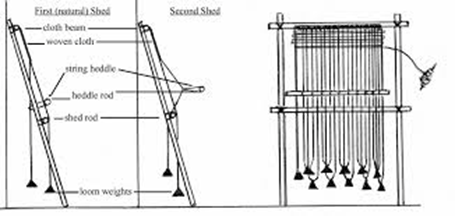
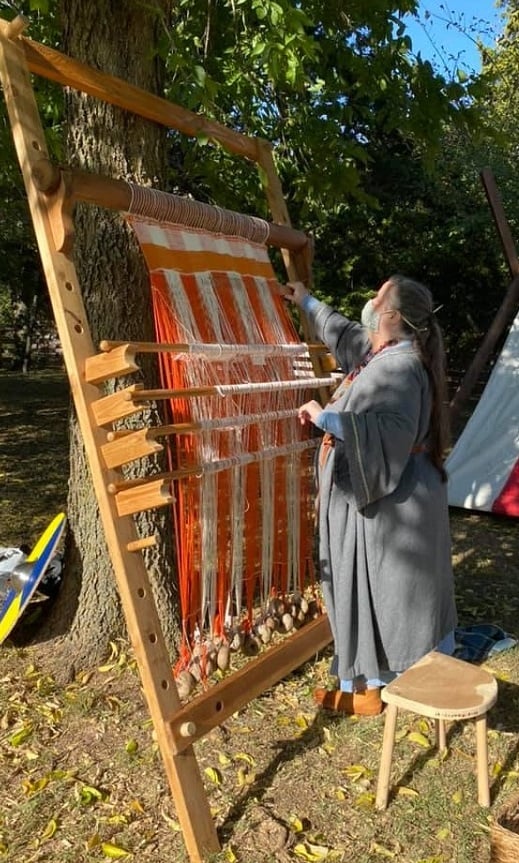
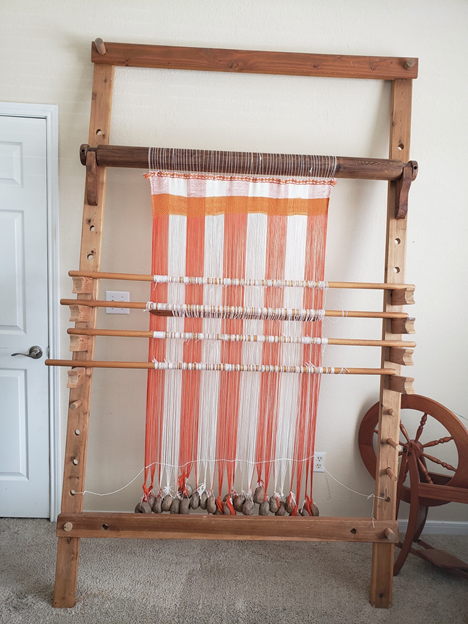
About the author:
For the beautiful and extensive obituary of Monica Furlong written by Michael De-la-Noy for The Guardian in 2003, click here.
****
From the foreword of Colman:
Monica Furlong was not only a writer of fantasy but also a journalist, broadcaster, poet, travel writer, biographer, and religious rebel. She was born in Kenton, northwest of London, to a family that wanted a boy. She once said she was sorry she hadn’t been born early enough to be a suffragette, fighting for the right of women to vote. Dreadfully shy, with a disabling stammer and fear of the telephone, she nevertheless obtained a job as telephone-answering secretary to a producer for BBC Radio. And her stammer did not prevent her from later success as a journalist, religious broadcaster for the BBC, and outspoken leader of the movement to ordain women in the Anglican Church.
Baptized as a child, she later left the Church only to return after what she called an overwhelming experience of the love of God. Her interest in and devotion to religion led her to write biographies of several religious figures, two books about the successes and decline of the Church of England, and her autobiography, Bird of Paradise.
With compassion and commitment, Monica Furlong spent her life searching for truth. Friends remember her as a life-enhancing presence, full of laughter and enthusiasm, passionate, warm, and honest. In truth, she sounds much like Juniper, the warm and wise woman whom we love through her books.
Monica Furlong died of cancer in January 2003. She is survived by a son, a daughter, and numberless fans.
Karen Cushman
April 2003
Sources:
Chollet, Mona. In Defense of Witches: The Legacy of the Witch Hunts and Why Women are Still on Trial. New York, St. Martin’s Griffin, 2023.
Furlong, Monica. Colman. New York, Random House, 2004.
- - -. Wise Child. New York, Random House, 1987.
Lory. “Monica Furlong: Wise and Wonderful.” Emerald City Book Review, 1 Jan. 2014, https://emeraldcitybookreview.com/2014/01/01/monica-furlong-wise-child-random-house/. Accessed 25 Feb. 2025.
Melissa. “Adventures in Pagan Fiction: Monica Furlong’s Wise Child Series.” Three Hundred and Sixty-Six: A Personal Exploration of Pagan Spirituality, 30 Jun. 2014, https://threehundredandsixtysix.wordpress.com/2014/06/30/adventures-in-pagan-fiction-monica-furlongs-wise-child-series/. Accessed 25 Feb. 2025.
Thériault, Anne. “Everyone Deserves a Mother Figure Like Juniper From Wise Child.” Electric Lit: Reading into Everything, 7 Jan. 2021, https://electricliterature.com/everyone-deserves-a-mother-figure-like-juniper-from-wise-child/. Accessed 25 Feb. 2025.
*This is issue #16 of The Book Moth Newsletter

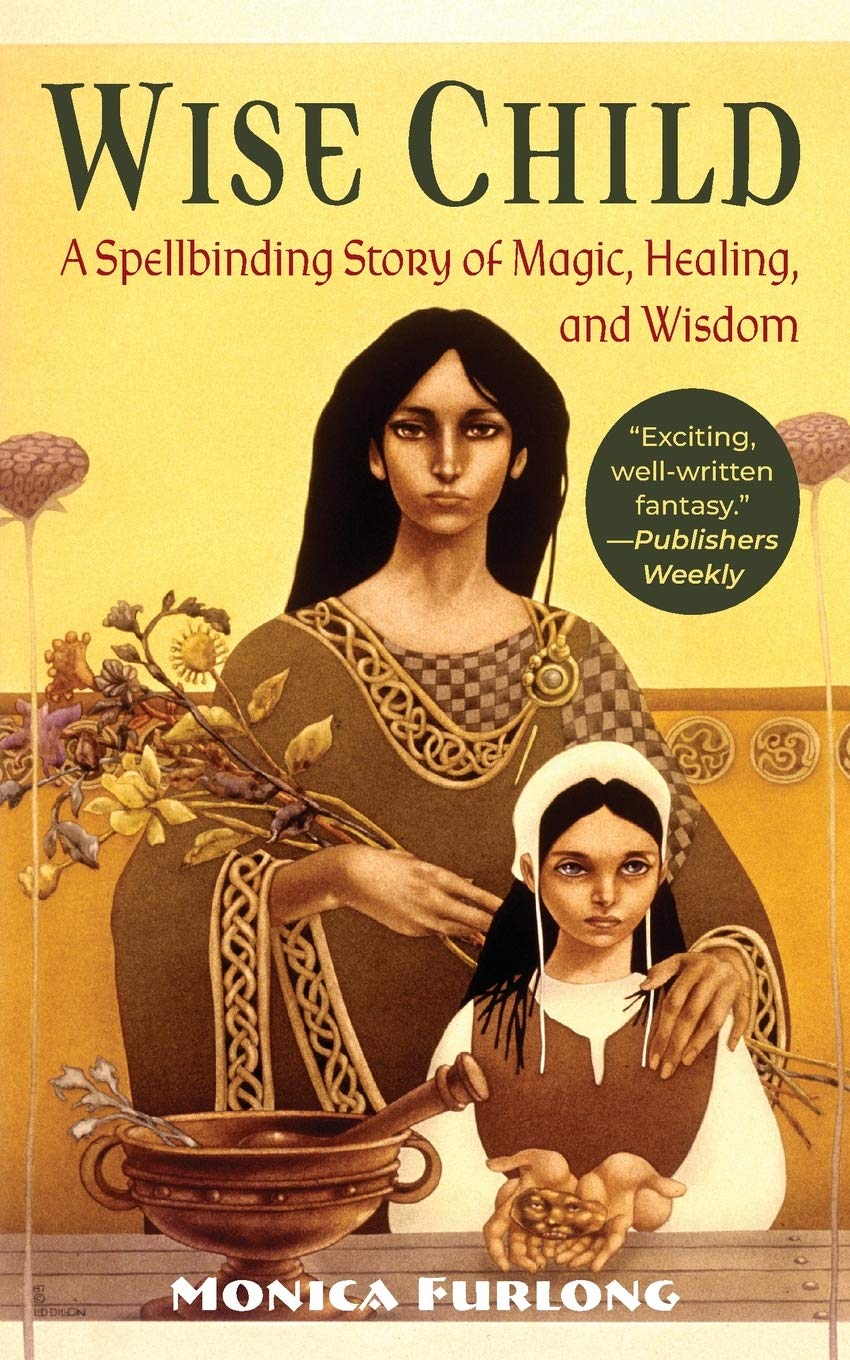
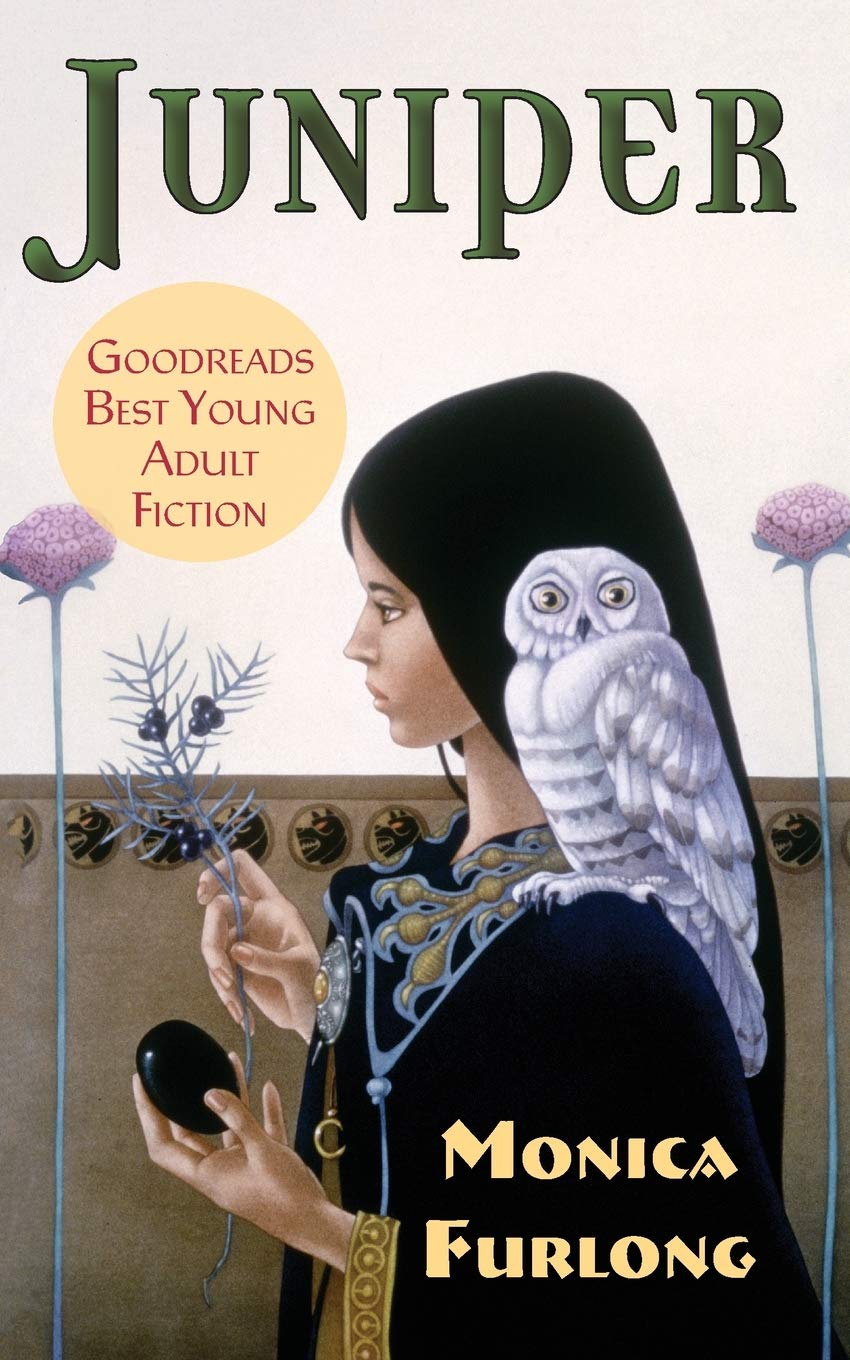

Add a comment: